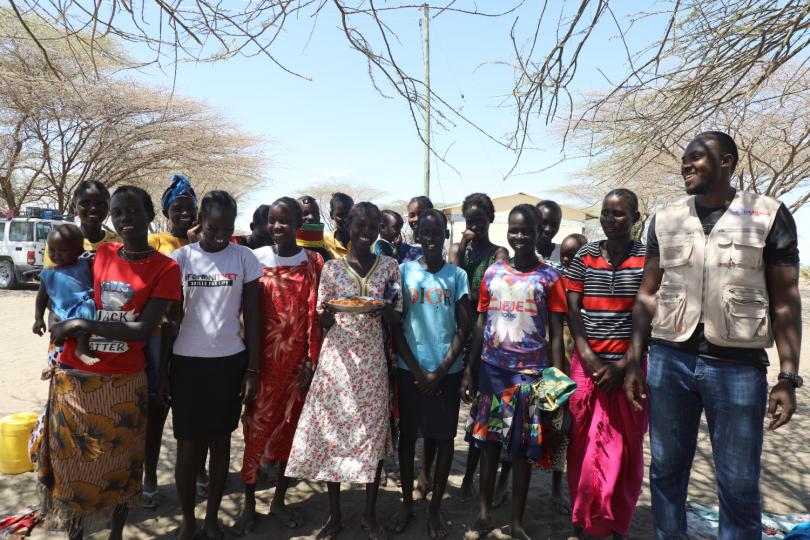INTERNATIONAL DAY OF THE GIRL CHILD - BUILDING A WORLD WHERE EVERY GIRL CAN LEAD AND THRIVE

Caroline Ekut distributing some fish balls to some of her friends in the group. Photo Courtesy| Dorothy Waweru, Save the Children
By Dorothy Waweru
“Women and girls can lead us to a fairer future... Let us amplify girls’ voices, and recommit to working together to build a world where every girl can lead and thrive." United Nations Secretary General António Guterres.
On a normal Thursday morning in Lomekwi area of Turkana North, women and girls are seen walking hastily to the lake. You might be fooled to think that they are going to fetch water, but they are not… In the true spirit of the saying, “the early bird catches the worm” most girls in this area are busy trying to get some fish early in the morning so as to sell them and earn a living for their families.
Fishing is a common livelihood practice in the lake region of Lomekwi.
On this particular day somewhere near the lake, we meet a group of 30 girls – they call themselves the Neema Group. The group was formed following empowerment sessions by the Mercy-Corp-led USAID Nawiri project that is being implemented in the area by Save the Children.
The USAID Nawiri project which started in 2019, is a five-year initiative funded by USAID’s Bureau for Humanitarian Assistance (BHA). The project’s goal is to sustainably reduce levels of persistent acute malnutrition in Kenya’s arid and semi-arid lands (ASALs). In Samburu and Turkana, USAID Nawiri is facilitated by a Mercy Corps-led consortium of diverse international and national partners including Save the Children, that share a commitment to putting county governments and their citizens in the driver’s seat of their own journeys to self-reliance.
The young ladies are among the beneficiaries of this initiative. They meet twice a month to learn from and encourage each other in matters of nutrition, life skills and good business practices.
Today, the girls have come to the meeting with firewood, jerrycans of water, cooking pans and food items such as fish, potatoes, eggs, bread and wheat flour. 26 year–old Sylvia Esinyen, the chairlady of this group informs the rest that after having a short catch up meeting, they will demonstrate to them how to make yummy fish balls for sale. This, she says, will help improve their sales. Sylvia says that she was taught this recipe from the nutrition-training sessions under the USAID Nawiri project.
“I joined Neema Group in 2022 when USAID Nawiri introduced their project here in my village. The project brought girls aged 14-24 years together to learn about nutrition, hygiene and Village Savings and Loans Associations (VSLAs). I have learnt a lot from these sessions and most of my learnings have really helped me in my fish business. The money I have been getting has helped me take care of my two children who are yet to join school,” says Sylvia.
Caroline Ekut, a young mother and a member of this group says that the USAID Nawiri project has really empowered her.
“This project has taught me a lot including the benefits of antenatal clinics, nutrition and hygiene especially during breastfeeding, to prevent opportunistic illnesses brought about by simple things like failure to wash hands before feeding the baby,” says Caroline adding that they have also learnt about savings. “The group contributes ksh 150 twice a month for savings and ksh 50 twice a month to go to the emergency fund.”
The women confess that prior to joining the group and before they knew about the program, they spent most of their days at home doing nothing after finishing their house chores.
As mid-day approaches, the girls from the Neema Group swing into action to demonstrate to the rest how to make the delicious fish balls. They do this methodically until a finished product – the meatballs - is presented to the rest of the girls.
As soon as the fish balls are ready, some community members buy some pieces at ksh 30 each while the remaining pieces are distributed among the girls and their children. On a good day the girls can make Ksh500 - Ksh1000 from the sale of this delicacy. This money is then ploughed back to their savings and members can get loans as per their needs and repay with a small interest.
“The fish balls are a highly nutritious meal for mothers and babies. Aside from nutrition, the value addition that has been done to the fish makes it more marketable enabling these girls to make more money if they sell it this way as compared to when the fish is just raw,” says Festus Imuton, Household Economic Strengthening Officer, Save the Children under the USAID Nawiri Project.

Festus Imuton sharing a light moment in the company of Neema Group members. Photo Courtesy|Dorothy Waweru, Save the Children
And as the world marks the International Day of the Girl Child, we are reminded that if effectively supported during the adolescent years, girls have the potential to change the world – both as the empowered girls of today and as tomorrow’s workers, mothers, entrepreneurs, mentors, household heads, and political leaders.
Disclaimer: This story is made possible by the generous support of the American people through the United States Agency for International Development (USAID). The contents of this story are the responsibility of Save the Children - Mercy Corps Consortium, and do not necessarily reflect the views of USAID or the United States Government.